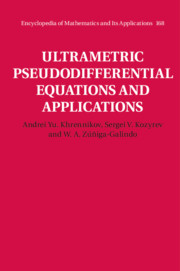Book contents
- Frontmatter
- Dedication
- Contents
- Preface
- 1 p-Adic Analysis: Essential Ideas and Results
- 2 Ultrametric Geometry: Cluster Networks and Buildings
- 3 p-Adic Wavelets
- 4 Ultrametricity in the Theory of Complex Systems
- 5 Some Applications of Wavelets and Integral Operators
- 6 p-Adic and Ultrametric Models in Geophysics
- 7 Recent Development of the Theory of p-Adic Dynamical Systems
- 8 Parabolic-Type Equations, Markov Processes, and Models of Complex Hierarchical Systems
- 9 Stochastic Heat Equation Driven by Gaussian Noise
- 10 Sobolev-Type Spaces and Pseudodifferential Operators
- 11 Non-Archimedean White Noise, Pseudodifferential Stochastic Equations, and Massive Euclidean Fields
- 12 Heat Traces and Spectral Zeta Functions for p-Adic Laplacians
- References
- Index
8 - Parabolic-Type Equations, Markov Processes, and Models of Complex Hierarchical Systems
Published online by Cambridge University Press: 10 May 2018
- Frontmatter
- Dedication
- Contents
- Preface
- 1 p-Adic Analysis: Essential Ideas and Results
- 2 Ultrametric Geometry: Cluster Networks and Buildings
- 3 p-Adic Wavelets
- 4 Ultrametricity in the Theory of Complex Systems
- 5 Some Applications of Wavelets and Integral Operators
- 6 p-Adic and Ultrametric Models in Geophysics
- 7 Recent Development of the Theory of p-Adic Dynamical Systems
- 8 Parabolic-Type Equations, Markov Processes, and Models of Complex Hierarchical Systems
- 9 Stochastic Heat Equation Driven by Gaussian Noise
- 10 Sobolev-Type Spaces and Pseudodifferential Operators
- 11 Non-Archimedean White Noise, Pseudodifferential Stochastic Equations, and Massive Euclidean Fields
- 12 Heat Traces and Spectral Zeta Functions for p-Adic Laplacians
- References
- Index
Summary
Introduction
During the last 30 years there has been a strong interest in stochastic processes on ultrametric spaces mainly due to their connections with models of complex systems, such as glasses and proteins. These processes are very convenient for describing phenomena whose spaces of states display a hierarchical structure, see e.g. [54]–[52], [135], [214], [231], [275], [336], [376], [411], [434], [468], [464], Chapter 4 and references therein. Avetisov, Kozyrev et al. constructed a wide variety of models of ultrametric diffusion constrained by hierarchical energy landscapes, see [54]–[52]. From a mathematical point of view, in these models the time-evolution of a complex system is described by a p-adic master equation (a parabolic-type pseudodifferential equation) which controls the time-evolution of a transition density function of a Markov process on an ultrametric space. This process describes the dynamics of the system in the space of configurational states which is approximated by an ultrametric space (Qp). This is the main motivation for developing a general theory of parabolictype pseudodifferential equations. For an in-depth discussion of the above matters the reader may consult Chapter 4.
This chapter has two goals. The first is to review some basic results about Ndimensional linear parabolic-type equations and their associated Markov processes. These equations are the main tool in the construction of many models of complex systems, and they have been studied extensively, see e.g. [275], [434], [470] and the references therein. For further details the reader may consult [470] and the references therein. The second goal is to present some of the results from [469], without proofs. This work initiates the study of non-Archimedean reaction–ultradiffusion equations and their connections with models of complex hierarchical systems. From a mathematical perspective, these equations are the p-adic counterpart of the integrodifferential models for phase separation introduced by Bates and Chmaj, and generalizations of the ultradiffusion equations on trees studied in the 1980s by Ogielski, Stein, Bachas, and Huberman, among others, and also generalizations of the master equations of the Avetisov, Kozyrev et al. models, which describe certain complex hierarchical systems. These equations are gradient flows of non-Archimedean freeenergy functionals, and their solutions describe the macroscopic density profile of a bistable material whose space of states has an ultrametric structure.
Information
- Type
- Chapter
- Information
- Ultrametric Pseudodifferential Equations and Applications , pp. 114 - 132Publisher: Cambridge University PressPrint publication year: 2018
